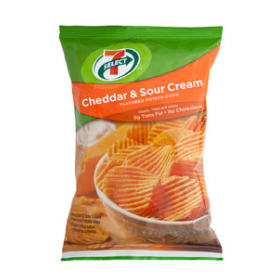Top Class Actions’s website and social media posts use affiliate links. If you make a purchase using such links, we may receive a commission, but it will not result in any additional charges to you. Please review our Affiliate Link Disclosure for more information.

U.S. District Judge Edward Davila dismissed the 7-Eleven potato chip class action lawsuit on April 21, filed by plaintiff Scott Bishop in 2012, after finding that there was no economic injury to the lead plaintiff.
Bishop alleged in the second amended complaint that he and a class of consumers relied on false information on the chips’ labels when purchasing the products that the chips had “0g trans fat” and “no cholesterol.” but Judge Davila agreed with 7-Eleven that it had made no false statements that would have caused consumers to buy the chips.
Bishop alleged in the 7-Eleven class action lawsuit that he had, since May 21, 2008, purchased a number of packages of 7-Select Cheddar & Sour Cream Chips, and argued, according to the order, “that the following representations on the packaging of this and other of [7-Eleven’s] food products were unlawful and/or misleading: (1) ‘0g trans fat’ and (2) ‘no cholesterol.'”
He went on to include 15 products that also used the same statements he claimed were unlawful and/or misleading: 7-Select Kettle Style Chips in barbeque, jalapeno, original, salt & vinegar, and sour cream & onion flavors; 7-Select barbeque potato chips; 7-Select big bite hot dog chips; 7-Select original potato chips; and 7-Select sour cream & onion chips. He brought his claim under California’s Unfair Competition Law, and violation of California state False Advertising Law and the Consumers Legal Remedies Act.
However, Bishop relied not on the misleading nature of the “0g trans fat” and “no cholesterol” statements, when the products actually contained some small amounts of trans fat and cholesterol, but on the lack of the Food and Drug Administration’s required disclosure statements. This was not enough, said Judge Davila, to prove that he relied on the deceptive advertising when purchasing the 7-Eleven potato chips, a requirement in proving economic injury.
In his decision, Judge Davila wrote, “To satisfy the injury-in-fact requirement for unfair competition claims, ‘courts in California require that plaintiffs demonstrate the purchase of products as a result of deceptive advertising.’ To plead actual reliance, the ‘plaintiff must allege that the defendant’s misrepresentations were an immediate cause of the injury-causing conduct.’ … However, ‘the plaintiff is not required to allege that those misrepresentations were the sole or even the decisive cause of the injury-producing conduct.’ A plaintiff can satisfy the UCL’s standing requirement by alleging that he or she would not have bought the product but for the alleged misrepresentation.” However, Davila went on to find, “the lack of disclosure on its own is not enough to confer standing on Plaintiff to bring a claim.”
Davila dismissed the 7-Eleven class action lawsuit with prejudice, leaving no window open for an amendment to the complaint.
Last August, Judge Davila dismissed an earlier version of the 7-Eleven class action lawsuit, telling Bishop that his allegations were too vague, and disagreeing that the potato chip labels in question constitute an express warranty. That class action lawsuit was based on breach of warranty claims under the Song-Beverly Consumer Warranty Act (SBCWA) and the Magnuson-Moss Warranty Act (MMWA).
Bishop is represented by Ben F. Pierce Gore of Pratt & Associates and David M. McMullen Jr. of Barrett Law Group PA.
The 7-Eleven Potato Chips False Advertising Class Action Lawsuit case is Scott Bishop v. 7-Eleven Inc., Case No. 5:12-cv-02621, in the U.S. District Court for the Northern District of California.
UPDATE: On May 11, 2016, Bishop asked the 9th U.S. Circuit Court of Appeals to revive a false advertising class action lawsuit that alleges 7-Eleven Inc. mislabels its store-brand potato chips because it omits legally-required disclaimers about the products’ fat content.
UPDATE 2: On June 7, 2016, The Ninth Circuit Appeals Court granted plaintiffs’ motion to revive a class action lawsuit against 7-Eleven alleging the store falsely labeled the nutritional value of its store-branded potato chips.
ATTORNEY ADVERTISING
Top Class Actions is a Proud Member of the American Bar Association
LEGAL INFORMATION IS NOT LEGAL ADVICE
Top Class Actions Legal Statement
©2008 – 2024 Top Class Actions® LLC
Various Trademarks held by their respective owners
This website is not intended for viewing or usage by European Union citizens.















3 thoughts on7-Eleven Potato Chip Mislabeling Class Action Lawsuit Dismissed
Add me
UPDATE 2: On June 7, 2016, The Ninth Circuit Appeals Court granted plaintiffs’ motion to revive a class action lawsuit against 7-Eleven alleging the store falsely labeled the nutritional value of its store-branded potato chips.
UPDATE: On May 11, 2016, Bishop asked the 9th U.S. Circuit Court of Appeals to revive a false advertising class action lawsuit that alleges 7-Eleven Inc. mislabels its store-brand potato chips because it omits legally-required disclaimers about the products’ fat content.